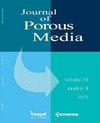Dissolution-driven convection in an inclined porous medium with first order chemical reaction
IF 2.3
4区 工程技术
Q2 ENGINEERING, MECHANICAL
引用次数: 0
Abstract
This article focuses on the initiation of dissolution-driven convection in an inclined porous layer and explores the influence of several important control parameters, including the inclination angle, Damkohler number, and Rayleigh number. Our investigation reveals that the boundaries of nonlinear stability and linear instability do not align, indicating that different behaviors occur in these regions of parameter space. As the inclination angle increases, the subcritical instability region expands, indicating a wider range of conditions where subcritical instability can occur. Moreover, transverse rolls demonstrate greater stability when compared to longitudinal rolls, highlighting the significant impact of convection pattern orientation on stability. Additionally, both the Damkohler number and inclination angle have stabilizing effects on the system, contributing to increased stability and a reduction in subcritical instability.具有一阶化学反应的倾斜多孔介质中的溶解驱动对流
本文重点研究了倾斜多孔层中溶解驱动对流的启动,并探讨了几个重要控制参数的影响,包括倾角、达姆克勒数和瑞利数。我们的研究发现,非线性稳定性和线性不稳定性的边界并不一致,这表明在参数空间的这些区域出现了不同的行为。随着倾角的增大,亚临界不稳定性区域也随之扩大,这表明亚临界不稳定性发生的条件范围更广。此外,与纵向辊相比,横向辊表现出更大的稳定性,突出了对流模式方向对稳定性的重要影响。此外,达姆克勒数和倾角都对系统有稳定作用,有助于提高稳定性和降低亚临界不稳定性。
本文章由计算机程序翻译,如有差异,请以英文原文为准。
求助全文
约1分钟内获得全文
求助全文
来源期刊

Journal of Porous Media
工程技术-工程:机械
CiteScore
3.50
自引率
8.70%
发文量
89
审稿时长
12.5 months
期刊介绍:
The Journal of Porous Media publishes original full-length research articles (and technical notes) in a wide variety of areas related to porous media studies, such as mathematical modeling, numerical and experimental techniques, industrial and environmental heat and mass transfer, conduction, convection, radiation, particle transport and capillary effects, reactive flows, deformable porous media, biomedical applications, and mechanics of the porous substrate. Emphasis will be given to manuscripts that present novel findings pertinent to these areas. The journal will also consider publication of state-of-the-art reviews. Manuscripts applying known methods to previously solved problems or providing results in the absence of scientific motivation or application will not be accepted. Submitted articles should contribute to the understanding of specific scientific problems or to solution techniques that are useful in applications. Papers that link theory with computational practice to provide insight into the processes are welcome.
 求助内容:
求助内容: 应助结果提醒方式:
应助结果提醒方式:


